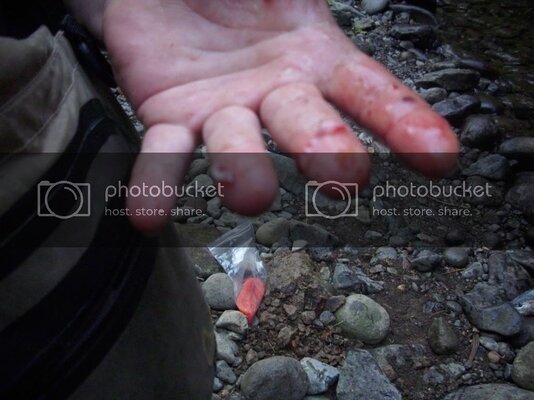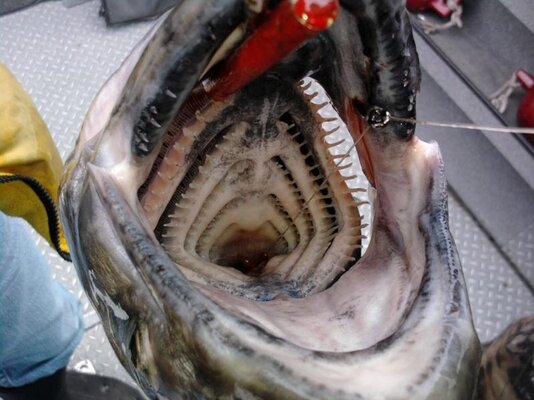A
AK Angler
0
Hunger is not a factor. But don't take it from me.
=================================
“For salmon, fat is where it’s at. When they’re living in the ocean, salmon eat a lot to store up plenty of fat. This fat is the fuel they need to get to their spawning grounds. Once salmon enter freshwater, they stop eating. So a salmon is a lot like a car that must make a long trip on one tank of gas. If anything delays the salmon, they may use up their fuel too soon — and not have enough to make it home.”
— U.S. Fish & Wildlife Service, Pacific Region
“Mature fish caught in a stream or river are unlikely to have any food in their digestive system. Spawning fish stop eating when they begin their upstream run, and may go up to 16 weeks without food before spawning and dying.”
— Great Canadian Rivers
“The salmon undergoes physiological changes as it travels. Before it enters fresh water, its digestive system shuts down. It may go without food for 12 months.”
— Parks Canada
“When the salmon begin their upriver spawning migration, they stop eating.”
— Pacific Northwest National Laboratory
“When they’re living in the ocean, salmon eat and store up fat for their return to their spawning grounds. Once salmon enter freshwater they no longer feed.”
— U.S. Fish & Wildlife Service, Pacific Southwest Region
“Salmon stop feeding as they enter fresh water. Their stomach is no longer needed and it begins to disintegrate internally -- leaving more room for the developing eggs and sperm.”
— ThinkSalmon.com
“Salmon stop eating and drinking when they enter fresh water, because the lack of salt water is a shock to their systems. The change is such a shock, in fact, that internal organs begin failing in some salmon.”
— Discovery Channel
“Even before salmon begin their upstream migrations, they begin changing from bright silver to dark brown and finally to black. Their digestive tracts shrink to almost nothing and they stop eating. As a result, salmon are reluctant to bite once they move into their home streams. Still, many are taken during the spawning run, probably because they strike out of instinct rather than hunger.”
— Reel Fishing Reports
“Salmon use all their energy for returning to their home stream, for making eggs and digging the nest. Most salmon stop eating when they return to freshwater and have no energy left for a return trip to the ocean after spawning.”
— U.S.G.S. Western Fisheries Research Center
“Salmon stop eating once they head toward their respective spawning grounds. They rely solely on fat reserves for energy.”
— PBS
“Salmon do not eat once they have entered fresh water and they leave the ocean heavy with the fats and nutrients that they will subsist on during their freshwater phase.”
— Alaska Seafood Marketing Institute
“The upstream journey of salmon to their spawning grounds may last weeks and cover thousands of kilometer — and they don't eat during the journey.”
— Canadian Museum of Nature
“King salmon are almost nothing like trout or bass. They do not bite like any other fish, in fact, they don't really bite at all. Spawning salmon are in the river only to breed. They do not eat once they hit fresh water.”
— AlaskaKings.com
“Upon entering freshwater, the salmon stop eating altogether and will only strike at other fish or a fisherman’s tackle in aggravation.”
— Fish Alaska Magazine
“In the preparation for spawning the digestive system atrophies so as to make continued existence impossible, but the atrophy supplies materials and space for gametes, and unburdens the fish of extra weight, unnecessary to the single reproductive effort, in its upstream journey. The mouth of the male undergoes changes which aid the fish in sexual combat, but make it unfit for the efficient ingestion of food.”
— George Williams quoted by Andrew Hendry, Asst. Professor of Biology at McGill University
“As salmon swim upstream to spawn, they stop eating and darken, and their jaws hook.”
— U.S. Forest Service
“Adult salmon returning to spawn do not eat but instead tap into fat and muscle energy reserves built up during several years in the ocean.”
— Seattle.gov
“Once they begin their spawn these fish stop eating and will eventually die.”
— Trout’s Fly Fishing
“Salmon do not usually feed after entering freshwater and severe atrophy of the digestive system sets in before spawning begins.”
— U.S. Fish & Wildlife Service (1982)
“Once adult salmon begin this arduous return journey, they stop eating entirely. Using stored energy, they battle their way upstream.”
— Idaho Rivers United
=================================
“For salmon, fat is where it’s at. When they’re living in the ocean, salmon eat a lot to store up plenty of fat. This fat is the fuel they need to get to their spawning grounds. Once salmon enter freshwater, they stop eating. So a salmon is a lot like a car that must make a long trip on one tank of gas. If anything delays the salmon, they may use up their fuel too soon — and not have enough to make it home.”
— U.S. Fish & Wildlife Service, Pacific Region
“Mature fish caught in a stream or river are unlikely to have any food in their digestive system. Spawning fish stop eating when they begin their upstream run, and may go up to 16 weeks without food before spawning and dying.”
— Great Canadian Rivers
“The salmon undergoes physiological changes as it travels. Before it enters fresh water, its digestive system shuts down. It may go without food for 12 months.”
— Parks Canada
“When the salmon begin their upriver spawning migration, they stop eating.”
— Pacific Northwest National Laboratory
“When they’re living in the ocean, salmon eat and store up fat for their return to their spawning grounds. Once salmon enter freshwater they no longer feed.”
— U.S. Fish & Wildlife Service, Pacific Southwest Region
“Salmon stop feeding as they enter fresh water. Their stomach is no longer needed and it begins to disintegrate internally -- leaving more room for the developing eggs and sperm.”
— ThinkSalmon.com
“Salmon stop eating and drinking when they enter fresh water, because the lack of salt water is a shock to their systems. The change is such a shock, in fact, that internal organs begin failing in some salmon.”
— Discovery Channel
“Even before salmon begin their upstream migrations, they begin changing from bright silver to dark brown and finally to black. Their digestive tracts shrink to almost nothing and they stop eating. As a result, salmon are reluctant to bite once they move into their home streams. Still, many are taken during the spawning run, probably because they strike out of instinct rather than hunger.”
— Reel Fishing Reports
“Salmon use all their energy for returning to their home stream, for making eggs and digging the nest. Most salmon stop eating when they return to freshwater and have no energy left for a return trip to the ocean after spawning.”
— U.S.G.S. Western Fisheries Research Center
“Salmon stop eating once they head toward their respective spawning grounds. They rely solely on fat reserves for energy.”
— PBS
“Salmon do not eat once they have entered fresh water and they leave the ocean heavy with the fats and nutrients that they will subsist on during their freshwater phase.”
— Alaska Seafood Marketing Institute
“The upstream journey of salmon to their spawning grounds may last weeks and cover thousands of kilometer — and they don't eat during the journey.”
— Canadian Museum of Nature
“King salmon are almost nothing like trout or bass. They do not bite like any other fish, in fact, they don't really bite at all. Spawning salmon are in the river only to breed. They do not eat once they hit fresh water.”
— AlaskaKings.com
“Upon entering freshwater, the salmon stop eating altogether and will only strike at other fish or a fisherman’s tackle in aggravation.”
— Fish Alaska Magazine
“In the preparation for spawning the digestive system atrophies so as to make continued existence impossible, but the atrophy supplies materials and space for gametes, and unburdens the fish of extra weight, unnecessary to the single reproductive effort, in its upstream journey. The mouth of the male undergoes changes which aid the fish in sexual combat, but make it unfit for the efficient ingestion of food.”
— George Williams quoted by Andrew Hendry, Asst. Professor of Biology at McGill University
“As salmon swim upstream to spawn, they stop eating and darken, and their jaws hook.”
— U.S. Forest Service
“Adult salmon returning to spawn do not eat but instead tap into fat and muscle energy reserves built up during several years in the ocean.”
— Seattle.gov
“Once they begin their spawn these fish stop eating and will eventually die.”
— Trout’s Fly Fishing
“Salmon do not usually feed after entering freshwater and severe atrophy of the digestive system sets in before spawning begins.”
— U.S. Fish & Wildlife Service (1982)
“Once adult salmon begin this arduous return journey, they stop eating entirely. Using stored energy, they battle their way upstream.”
— Idaho Rivers United
Last edited by a moderator:

